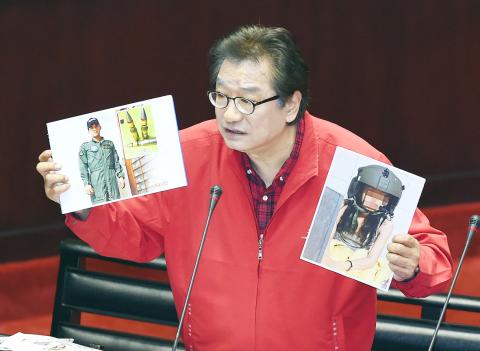The nation’s elite aviation units suffered another embarrassment when an officer at the 602nd Air Cavalry Brigade was found to have taken his pilot’s helmet for an AH-1W Super Cobra attack helicopter off base without authorization and taken it home.
The debacle came to light after photographs of the pilot, a first lieutenant, and his girlfriend wearing the high-tech helmet were uploaded to the Internet, and netizens began to circulate it, saying it was another breach of discipline and security in the military.
News reports indicated the pilot had been trained to fly the US-made helicopters for a squadron based at the 602nd Brigade, which is in the Sinshe area (新社) of Taichung.

Photo: Liao Chen-huei, Taipei Times
The 602nd is one of the army’s three main elite aviation units, along with the 601st Brigade and the Pingtung-based Altitude Special Service Company.
According to an internal military investigation, the transgression occurred in 2013, when the pilot in question took home the helmet when he was assigned for helicopter flight-training at an aviation base in Hengchun (恆春), Pingtung County.
“On the way to the air base, the pilot made a stopover at his girlfriend’s house in Pingtung. The girlfriend was curious about the pilot’s headgear and she put it on, and posed for photographs with it at her home,” Army Command Headquarters Office spokesperson Major General Huang Kai-shen (黃開森) said.
Huang said the helmet for the AH-1W Super Cobra has only simple communication devices, and does not contain the advanced visual sensors and weapons controls of the Integrated Helmet and Display Sight System of the Apache AH-64E attack helicopter.
Huang confirmed the pilot was also carrying four pieces of netting used to camouflage military vehicles, which he left at his girlfriend’s house.
Media and netizens also circulated photographs of the pilot displaying a photograph of three shells from a T-25 artillery gun, which angered more people, who said it was evidence of a lax attitude to the handling of equipment and ammunition because he had taken them off base to show to civilians.
“The pilot in question has been grounded from flying and, pending the conclusion of our investigation, he will receive punishment in accordance with military regulations,” Huang said.
Huang said the artillery shells had not been in the pilot’s possession.
“Those came from a friend, surnamed Chen (陳). He picked up the unexploded rounds from a target range and sent the pictures by e-mail, so the pilot was not in possession of the artillery shells,” Huang said.
Chinese Nationalist Party (KMT) Legislator Lee Ching-hua (李慶華) denounced what he called the misconduct and lack of discipline of the nation’s troops when he questioned Deputy Minister of National Defense Admiral Chen Yung-kang (陳永康) at the legislature yesterday.
“Officers and soldiers are handling weapons and equipment as though they are toys. Military bases are now like playgrounds for these men,” Lee said.
“How can the public have trust and confidence in the armed forces?” he asked.

MAKING WAVES: China’s maritime militia could become a nontraditional threat in war, clogging up shipping lanes to prevent US or Japanese intervention, a report said About 1,900 Chinese ships flying flags of convenience and fishing vessels that participated in China’s military exercises around Taiwan last month and in January last year have been listed for monitoring, Coast Guard Administration (CGA) Deputy Director-General Hsieh Ching-chin (謝慶欽) said yesterday. Following amendments to the Commercial Port Act (商港法) and the Law of Ships (船舶法) last month, the CGA can designate possible berthing areas or deny ports of call for vessels suspected of loitering around areas where undersea cables can be accessed, Oceans Affairs Council Minister Kuan Bi-ling (管碧玲) said. The list of suspected ships, originally 300, had risen to about

DAREDEVIL: Honnold said it had always been a dream of his to climb Taipei 101, while a Netflix producer said the skyscraper was ‘a real icon of this country’ US climber Alex Honnold yesterday took on Taiwan’s tallest building, becoming the first person to scale Taipei 101 without a rope, harness or safety net. Hundreds of spectators gathered at the base of the 101-story skyscraper to watch Honnold, 40, embark on his daredevil feat, which was also broadcast live on Netflix. Dressed in a red T-shirt and yellow custom-made climbing shoes, Honnold swiftly moved up the southeast face of the glass and steel building. At one point, he stepped onto a platform midway up to wave down at fans and onlookers who were taking photos. People watching from inside

Japan’s strategic alliance with the US would collapse if Tokyo were to turn away from a conflict in Taiwan, Japanese Prime Minister Sanae Takaichi said yesterday, but distanced herself from previous comments that suggested a possible military response in such an event. Takaichi expressed her latest views on a nationally broadcast TV program late on Monday, where an opposition party leader criticized her for igniting tensions with China with the earlier remarks. Ties between Japan and China have sunk to the worst level in years after Takaichi said in November that a hypothetical Chinese attack on Taiwan could bring about a Japanese

STREAMLINED: The dedicated funding would allow the US to transfer equipment to Taiwan when needed and order upgraded replacements for stockpiles, a source said The US House of Representatives on Thursday passed a defense appropriations bill totaling US$838.7 billion, of which US$1 billion is to be allocated to reinforcing security cooperation with Taiwan and US$150 million to replace defense articles provided to the nation. These are part of the Consolidated Appropriation Act, which the US House yesterday passed with 341 votes in favor and 88 against. The act must be passed by the US Senate before Friday next week to avoid another government shutdown. The US House Committee on Appropriations on Monday unveiled the act, saying that it allocates US$1 billion for the Taiwan Security Cooperation Initiative